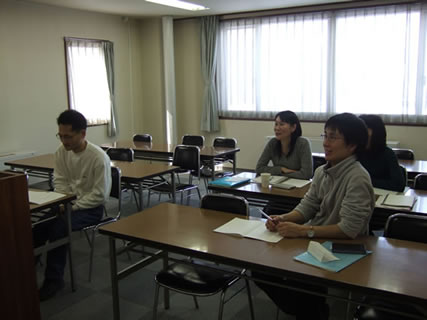| Annual Newsletter of the Slavic Research Center,
Hokkaido University |
||
| No.16
, January 2009 |
back to INDEX>> | |
| Our Current Staff |
Ongoing Cooperative Research
Projects |
Visitors from Abroad |
Guest Lectures from Abroad |
Publications (2007-08) |
The Library |
Website Access Statistics |
| Mikhail Shkarovskiy |
Sergey Vradiy |
Gulmira Sultangaliyeva |
In 2007, the JSPS introduced a new type of grant, named the International Training Program for Young Scholars (ITP). The JSPS thought that the existing various grants for study abroad were often built on unspecified purposes and did not provide young scholars with appropriate opportunities for international training in research and teaching, even though they live abroad for a long period. The applicant organizations for this new program were requested to elaborate a concrete and attractive training menu for the young scholars dispatched to foreign partner organizations. The SRC failed to be accepted in its first attempt in this program in autumn 2007, exactly because the selection committee did not find our program sufficiently concrete. At that time, we only emphasized the elite characteristics of our partners, impressively distinguished from those of other applicant organizations, and our high demands imposed on ITP fellows dispatched to these partners (giving papers at leading conventions and submitting manuscripts to prestigious journals). After the failure, we enriched the training menu and won the prize in our second attempt in early 2008.
The SRC chose three of our traditional partners – the Davis Center of Harvard University, George Washington University, and St. Antony’s College of Oxford University – as the foreign partners for ITP. We called for applications for ITP fellows who will stay at foreign partner organizations for ten months. Since we called for applications as late as early spring, when scholars were already bound to the lectures in the next semester and since our requests for applicants were relatively high (having a doctoral degree and publications in foreign languages), only seven applied, but their admirable qualities made the selection quite difficult. Eventually, the selection committee chose four fellows (it decided to dispatch two Oxford scholars).
 |
|
|
A scene from "English canp"
|
These fellows left Japan for the US and Britain in June and August. They will stay there at least until March 2009. Some of them have already presented papers at prestigious conventions, such as the AAASS. They started to prepare events that will be held under collaboration with their host organizations.
Our ITP has not been confined to those who were dispatched; we have produced various events for the training of a larger group of young scholars. For example, in February 2008, three young scholars presented papers at Seoul National and Hokkaido Universities’ joint symposium held in Seoul. Two of these papers were submitted to foreign journals and accepted. In March, we held an English camp, hiring three professional trainers in academic presentation and debate and inviting about 20 young Slavicists from all over Japan. They stayed at a seminar house in the southern suburbs of Sapporo for two weeks, voluntarily abandoning talking in Japanese and Russian. In May, we held a seminar for academic writing in English along with intense training in academic writing, which continued for two days. In the concluding session of this event, Professor Diane Koenker, former editor of Slavic Review, and Terry Martin, editor of Europe-Asia Studies, gave lectures on the requirements and expectations of the world-leading journals.
Now we are preparing the first East Asian Conference for Slavic Eurasian Studies, held at Hokkaido University on February 5–6, 2009. Young scholars of Japan have played an important role in proposing panels and papers.
MATSUZATO Kimitaka
